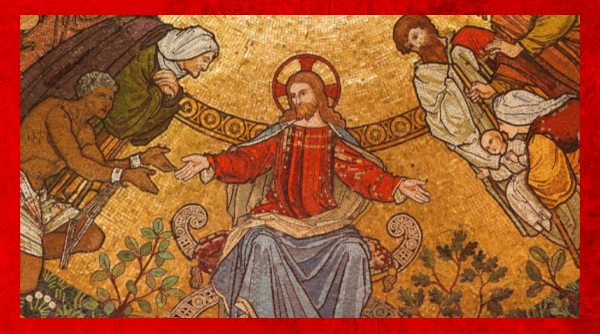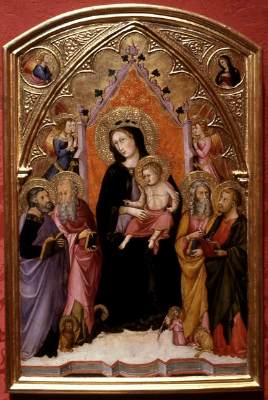Finding God in all things

Teach me, Lord, your way that I may walk in your truth, single-hearted and revering your name. (Psalm 86:11)
For St. Ignatius of Loyola, it was important to see God in all things. This is how we remain in awe of Him every waking moment. How to see God in all things, however, must be defined by Sacred scripture and tradition. Indeed, God is in all of creation by His essence, presence, and power. We marvel at creation because of the magnificence of its Creator. He continues to give being, existence, to each and all are subject to His power of holding its life in His hands. He imparts His very esse onto us to maintain our life in each moment of each breath. It is both beautiful and personal.
First Commandment: You shall have no other gods but me (Exodus 20:3)
In modern times, the idea of seeing God in all things is sometimes misunderstood. Because of the vocabulary used in pagan spiritualities, Christians too easily meld their beliefs with those taught by new age practitioners and in Eastern religions (Buddhism, Hinduism). Those spiritualities believe (in varied ways) that a person’s spiritual growth leads them to become one in God, the same substance or nature as Him; to meld with God and become God. Or/and to meld in with the ‘divine wisdom’ into one collective consciousness. Or/and to take in the ‘spirit’ of plants and rocks to nourish their own spirit. All of these are modern forms of ancient heresies based in a misunderstanding of God and the human person. Additionally, only the Judeo-Christian religions see God as the object and purpose of all we do. Other religions and spiritualities focus on perfecting ourselves for the purpose of creating our own happiness. Some form of a god may be part of their belief but it is not the object and purpose of it.
All of creation is the effect or outcome of God’s creating action. Lower-order creation (minerals, plants, animals etc.) have a ‘trace representation’ of God that it represents some attributes of His beauty, goodness, power, etc. This is the manner in which we see God in all lower-order creation. It demonstrates He is at the beginning of all while also is in the present moment. Creation in itself is not sacred. If we treat it as such, then our heart is divided and we cannot fully be in awe of God. We unknowingly make it an idol, breaking the first commandment.
Animals and plants have souls through which God imparts His esse to keep them alive and withdraws that when it is time for them to die. They do not have spirits. Humans, however, have spiritual souls. Our souls, like plants and animals, serve as the mode and means by which God gives us existence. But our souls are spiritual, having spiritual functions and capacities because we are made in the image of God. We represent Him not by trace of attributes but by image, which means we have a likeness to Him. It is by our spiritual faculties that we can know and love truth and goodness.
“The glory of God is a human being fully alive. And to be alive consists in beholding God.” (St. Irenaeus)
Why is this important? Without an accurate understanding of who God is, our ability to grow in this loving relationship with Him is impeded because we cannot fully receive that love. Think about one person who is very dear to your heart. That relationship grew because you came to know them intimately, heart to heart. Likewise, consider a person that you thought you knew but were stunned to see ‘another side of them’…that relationship cannot grow deep because you never really knew their true ‘self’. You were basing your affection for them on a distorted image of who they truly are. The same is true of God. We must know and accept who He truly is in order to receive and reciprocate His love.
His divine power has given us everything needed for life and godliness, through the knowledge of him who called us by his own glory and goodness. Thus he has given us, through these things, his precious and very great promises, so that through them you may escape from the corruption that is in the world because of lust, and may become participants of the divine nature. (2 Peter 1:3-4)
Why is this important? Because it is God’s plan for all of mankind. The purpose of the Christian life is to grow in His love. We do so by allowing Him to heal our woundedness, cooperate with grace, and grow in virtue. By this means we begin to ‘partake’ in His divine life (2 Peter 1:4) right now in our everyday life. Our nature does not change; rather, it is perfected. Then, by His grace and our cooperation, He brings us into the Trinitarian dynamic of love which is always occurring between the Father, Son and Spirit. As we grow in His likeness, it is not a passage into becoming Him. It is a maturation into becoming fully human by which with His grace we can fully and perfectly love Him. Authors Meconi and Olson quote Norman Russell’s explanation that, “Our sharing in the attributes of divinity is conditioned on our fully acquiring the attributes of humanity.”[1]
Thus our existence is the greatest of testimony to His magnificence and power. But He also gives each of us certain forms of beauty and goodness designed to our own uniqueness. And we each have a purpose for our existence, some manner by which we praise and love Him thereby becoming an instrument of love to others. He has designed complementarity across personalities and purposes that serve to bring order and harmony in the cosmos. All of this is His plan for Divine Providence, His infinite wisdom of His Divine Mind exhibited only in us who are created in His image.
Thus, if you did not exist, there would something of the wisdom of God that the world would never know, hidden from the entire cosmos. Every life matters.
See what love the Father has bestowed on us that we may be called the children of God. Yet so we are. The reason the world does not know us is that it did not know him. Beloved, we are God’s children now; what we shall be has not yet been revealed. We do know that when it is revealed we shall be like him, for we shall see him as he is. Everyone who has this hope based on him makes himself pure, as he is pure. (1 John 3:1-3)
Ad Majorem Dei Gloriam 😊
(Image by Hobi Photography from Pexels)
[1] David Meconi, and Carl Olson, “The Scriptural Roots of Christian Deification”, in Called to be the Children of God: The Catholic Theology of Human Deification, ed. David Meconi, and Carl Olson (San Francisco, CA: Ignatius Press, 2016), 37

Thank you for caring and sharing appropriately...
Consecrated to the Sacred Heart of Jesus through the Immaculate Heart of Mary. Except where noted, all design, writing and images ©2024 by Debra Black and TheFaceofGraceProject.com. All Rights Reserved. No part of this website may be reproduced, distributed or transmitted in any form or by any means, including downloading, photocopying, recording, or other electronic or mechanical methods, without the prior written permission of the publisher, except in the case of brief quotations embodied in critical reviews and certain other noncommercial uses permitted by copyright law. For permission or to report violations please email: thefaceofgraceproject@gmail.com
